Philadelphia / Bucks County LASIK Surgeon – Dr. James S. Lewis
Eye News Volume I Issue 7

Personalized instrumentation for each
LASIK patient
LASIK patient
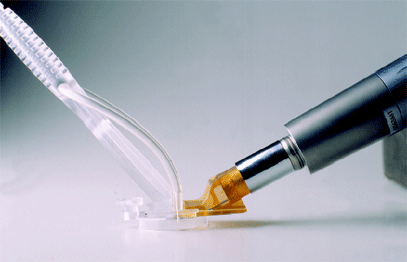
The Moria One Disposable maximizes sterility,
efficiency, precision, and quality.
efficiency, precision, and quality.
© Copyright Moria, INC.
Bartell brings surgeons new technology
Moria S.A., a French company serving the needs of Ophthalmologists for 180 years merged with Microtech, INC of Doylestown, PA, in June, 2000.
Mike Bartell, president and founder of Microtech along with his partner Charlie Mastellone are now co-chief operating officers of the new company, Moria, INC.
“There is a strong emphasis on disposables for LASIK surgery throughout Europe”, Bartell stated in a telephone interview this week. “The labor-intensive sterilization requirements make the convenience of the Moria One Disposable extremely attractive.”
Brian Pirollo of Moria, INC., said, “The accuracy and reliability of this device are outstanding. Surgeons who have tried it are convinced almost immediately. Most feel it is well worth the increased cost.”
“With the Moria One Disposable no one has to touch and potentially dull the extremely delicate blade. High volume surgeons and even surgeons with a lower case load will be drawn to its benefits”, Bartell continued.
James Lewis, MD, Medical Director of Advanced Laser Vision thought the instrument would be ideal for select cases. “I never thought a LASIK flap could be so precise, reproducible, and clean”, said Lewis.
“Once I saw how well the Moria worked, I knew we had to provide this quality to every LASIK patient”, Lewis continued. “You just can’t measure the value of a faster recovery.”
Bartell broke new ground in 1987 when he patented the inserter for foldable intraocular lenses. It took 4 years for the FDA to approve these lenses and another four years of patent litigation before his contribution was recognized. Now virtually every foldable intraocular lens used during cataract surgery relies on Bartell’s innovation (and patent).
The housing for the Moria One Disposable blade is shown below. It arrives sterile, inspected, and assembled. It is custom ordered and adjusted for every patient and discarded after a single use. Cross-contamination, corneal toxicity, instrument damage and sterilization failure are virtually eliminated.
“Forget the ease of use and faster turnover, this simply cuts a better flap. It is thin, uniform, and reproducible. I love this thing…and so do the patients”, Lewis said.
Dr. Fabriziani saw the first round of post-operative Moria One Disposable patients twenty-four hours after LASIK. He claimed, “The worst vision I measured today was 20/20. Most of my patients were 20/15.”
“I am having trouble even seeing where the surgery was performed. The eye heals overnight”, Fabriziani continues.
“There is no secret that Mike Bartell is a winner. He remains humble despite his extraordinary accomplishments”, Lewis continued. “I am glad he has turned his attention to LASIK. We benefit from his almost intuitive assessment of quality. He will help all of us to be better surgeons.”
Mike Bartell, president and founder of Microtech along with his partner Charlie Mastellone are now co-chief operating officers of the new company, Moria, INC.
“There is a strong emphasis on disposables for LASIK surgery throughout Europe”, Bartell stated in a telephone interview this week. “The labor-intensive sterilization requirements make the convenience of the Moria One Disposable extremely attractive.”
Brian Pirollo of Moria, INC., said, “The accuracy and reliability of this device are outstanding. Surgeons who have tried it are convinced almost immediately. Most feel it is well worth the increased cost.”
“With the Moria One Disposable no one has to touch and potentially dull the extremely delicate blade. High volume surgeons and even surgeons with a lower case load will be drawn to its benefits”, Bartell continued.
James Lewis, MD, Medical Director of Advanced Laser Vision thought the instrument would be ideal for select cases. “I never thought a LASIK flap could be so precise, reproducible, and clean”, said Lewis.
“Once I saw how well the Moria worked, I knew we had to provide this quality to every LASIK patient”, Lewis continued. “You just can’t measure the value of a faster recovery.”
Bartell broke new ground in 1987 when he patented the inserter for foldable intraocular lenses. It took 4 years for the FDA to approve these lenses and another four years of patent litigation before his contribution was recognized. Now virtually every foldable intraocular lens used during cataract surgery relies on Bartell’s innovation (and patent).
The housing for the Moria One Disposable blade is shown below. It arrives sterile, inspected, and assembled. It is custom ordered and adjusted for every patient and discarded after a single use. Cross-contamination, corneal toxicity, instrument damage and sterilization failure are virtually eliminated.
“Forget the ease of use and faster turnover, this simply cuts a better flap. It is thin, uniform, and reproducible. I love this thing…and so do the patients”, Lewis said.
Dr. Fabriziani saw the first round of post-operative Moria One Disposable patients twenty-four hours after LASIK. He claimed, “The worst vision I measured today was 20/20. Most of my patients were 20/15.”
“I am having trouble even seeing where the surgery was performed. The eye heals overnight”, Fabriziani continues.
“There is no secret that Mike Bartell is a winner. He remains humble despite his extraordinary accomplishments”, Lewis continued. “I am glad he has turned his attention to LASIK. We benefit from his almost intuitive assessment of quality. He will help all of us to be better surgeons.”
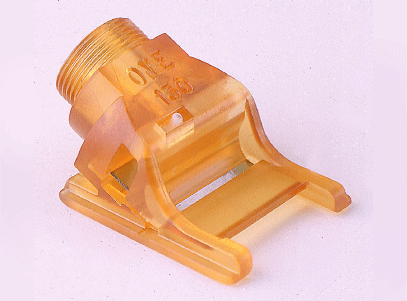
Housing for Moria One Disposable Microkeratome
© Copyright Moria, INC.
Advanced Laser Vision becomes first to use Disposable Microkeratome Exclusively
JENKINTOWN, Pa_ “He [James Lewis, MD] is never satisfied”, according to Sue Cross, chief LASIK Coordinator. “If there is new technology and it works……you can bet we’ll be the first to have it”.
“We like the concept of disposable instrumentation”, said Dr. Marc Myers. Myers is the newest member of the LASIK team. “There is a reduced risk of DLK (Diffuse Lamellar Keratitis), cross-contamination, and instrument damage.”
Tuyet Wong, RN was one of the early patients to benefit from the new instrumentation. She is pictured below immediately after LASIK with her husband, Bruce Wong, MD.
Dr Wong, a physician and the new Vice President of Outcomes Research at Bristol-Myers also had LASIK at Advanced Laser Vision a year ago.
“We used the Carriazo-Barraquer [microkeratome] for Dr. Wong’s surgery“, continued Dr. Myers. “At the time, we thought it couldn’t get better than that.”
Tuyet and her husband have seen 20/20 (and sometimes 20/15) in each eye at every postoperative visit.
“We like the concept of disposable instrumentation”, said Dr. Marc Myers. Myers is the newest member of the LASIK team. “There is a reduced risk of DLK (Diffuse Lamellar Keratitis), cross-contamination, and instrument damage.”
Tuyet Wong, RN was one of the early patients to benefit from the new instrumentation. She is pictured below immediately after LASIK with her husband, Bruce Wong, MD.
Dr Wong, a physician and the new Vice President of Outcomes Research at Bristol-Myers also had LASIK at Advanced Laser Vision a year ago.
“We used the Carriazo-Barraquer [microkeratome] for Dr. Wong’s surgery“, continued Dr. Myers. “At the time, we thought it couldn’t get better than that.”
Tuyet and her husband have seen 20/20 (and sometimes 20/15) in each eye at every postoperative visit.
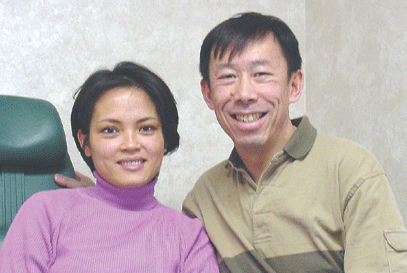
Robert Hayes (below) didn’t let the residual eyelid antiseptic stop him. He started to put his own microkeratome through the paces after he walked from the operating suite.
“Since we began using the disposable I’ve been amazed with the patient’s rapid visual recovery”, explained Dr. Myers.
Just minutes after LASIK Robert Hayes is focused on surgical technique. Perhaps he is planning a career change.
“Since we began using the disposable I’ve been amazed with the patient’s rapid visual recovery”, explained Dr. Myers.
Just minutes after LASIK Robert Hayes is focused on surgical technique. Perhaps he is planning a career change.
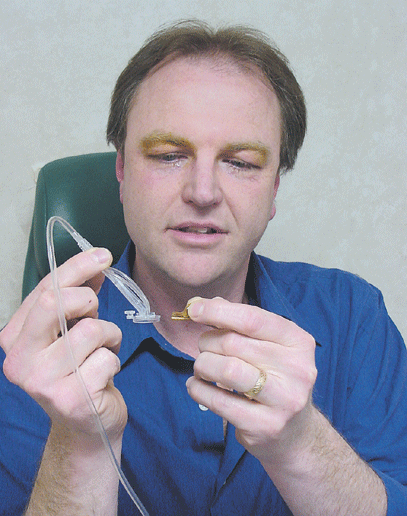
Robert Hayes tinkers immediately after LASIK.
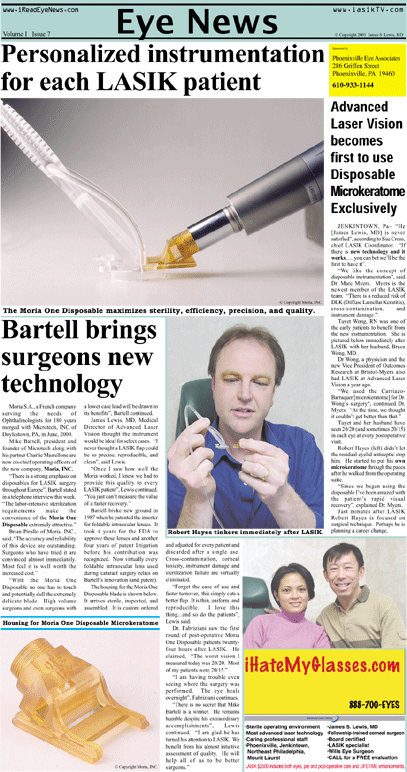
Dr. James S. Lewis takes great pride in his reputation as a foremost LASIK Bucks County / Philadelphia surgeon. To serve the unique vision correction needs of each patient, he offers various forms of laser vision correction, such as LASIK and Epi-LASIK in Philadelphia. In addition, he specializes in helping Visian ICL Bucks County / Philadelphia patients realize their dreams of clear vision without glasses.